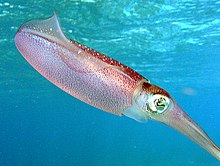Protostomia
| Protostomes Temporal range: Ediacaran - Recent |
|
|---|---|
 |
|
| A Caribbean Reef Squid, an example of a protostome | |
| Scientific classification | |
| Domain: | Eukaryota |
| Kingdom: | Animalia |
| Subkingdom: | Eumetazoa |
| (unranked): | Bilateria |
| (unranked): |
Protostomia Grobben, 1908 |
| Superphyla | |
Protostomia (from Greek πρώτο - proto = first + Στόμα - stoma = mouth) are a clade of animals. Together with the deuterostomes and xenacoelomorpha, they make up the Bilateria, mostly comprising animals with bilateral symmetry and three germ layers. The major distinctions between deuterostomes and protostomes are found in embryonic development: most (but, confusingly, not all) protostomes undergo Protostomy, whereas most deuterostomes undergo Deuterostomy.
In animals at least as complex as earthworms, the embryo forms a dent on one side, the blastopore, which deepens to become the archenteron, the first phase in the growth of the gut. In deuterostomes, the original dent becomes the anus while the gut eventually tunnels through to make another opening, which forms the mouth. The protostomes were so named because it used to be thought that in their embryos the dent formed the mouth while the anus was formed later, at the opening made by the other end of the gut.
Other significant differences between protostome and deuterostome patterns of development include:
Current molecular data suggest that protostome animals can be divided into the major groups:
as well as minor taxa of basal or ambiguous affinity, namely the Chaetognatha.
...
Wikipedia
